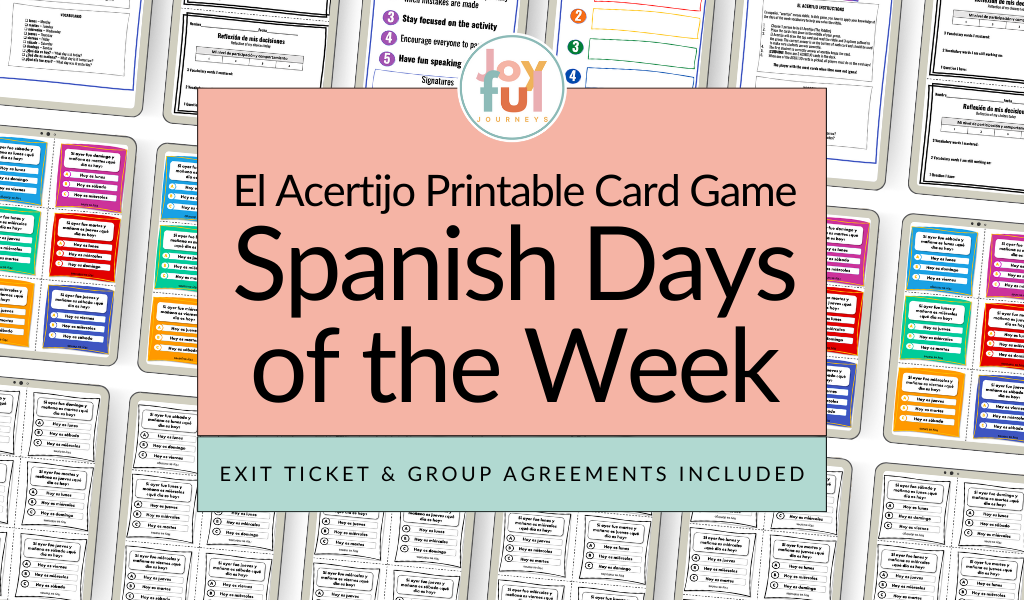Hey there, Joyful Journey Makers! Let’s talk about how board games can transform your Spanish classroom into a fun, stress-free environment where students can learn without worrying about making mistakes. Games are an amazing tool to help students practice their language skills, and there’s science behind why a relaxed brain learns better.
In this post, we’ll explore the neuroscience behind game-based learning, the benefits of a low-stress classroom environment, and introduce my FREE Spanish Days of the Week Board Game—a FREE activity that brings learning to life through play (go grab yours)!
Why a Stress-Free Environment is Key for Language Learning
When students feel anxious or worried about making mistakes, their brain’s ability to process new information decreases. Here’s why a stress-free environment is crucial for language acquisition:
The Neuroscience Behind Learning Through Play
Playing games has a powerful effect on the brain. Studies have shown that:
- Games reduce cortisol, the hormone associated with stress, allowing students to feel calm and more focused.
- Dopamine release during game-based learning increases motivation and helps create positive associations with the material being learned.
- Active engagement in games keeps students alert, which leads to better retention of new vocabulary and concepts.
In short, board games create a fun, relaxed atmosphere that enhances students’ ability to learn and retain new information—without the pressure of perfection.
How Board Games Create a Fun, Low-Pressure Learning Environment
Board games offer a perfect combination of interactive learning and stress-free practice. Here’s why they work so well for language learning:
- Encourage Participation Without Pressure: Students can practice speaking, listening, and reading in Spanish without the fear of being put on the spot. Games like board games allow students to engage with the material at their own pace.
- Make Mistakes Fun: Mistakes are inevitable in any game, but when they happen in the context of play, they don’t feel discouraging. Games offer a safe space where students can learn from their mistakes without stress.
- Foster Collaboration and Communication: Many board games involve working in pairs or groups, which means students have the opportunity to collaborate and communicate in Spanish. This promotes real-world language use while keeping the atmosphere light-hearted.
Get Your FREE Resource: Spanish Days of the Week Board Game
Now, let me introduce you to a fun, free resource that brings all these benefits to your classroom—my FREE Spanish Days of the Week Board Game (it’s free so…what’s stopping you?)! This board game is designed to help students practice days of the week vocabulary in Spanish in a playful, low-pressure setting.
What’s Included:
- Full-Color and Black & White Game Boards: Print the board in full color or black and white, depending on your classroom’s needs.
- Game Cards and Spinner: The game includes cards with questions like “¿Qué día es hoy?” (What day is today?), as well as a spinner and game pieces to make the game engaging and interactive.
- Reflection Exit Ticket: At the end of the game, students fill out a reflection sheet to review what they’ve learned, giving you insight into their progress.
How to Use the Spanish Days of the Week Board Game in Your Classroom
- Whole-Class Play: Use the board game as a fun way to wrap up a lesson on days of the week. Divide students into small groups and let them take turns spinning the spinner, answering questions, and moving their pieces. The goal is to reach ¡META! first, but the real goal is learning while having fun!
- Small Group Practice: The game works well in small groups too! Assign groups of 3-4 students to play together. This gives everyone a chance to practice speaking and answering questions in a more intimate, low-pressure setting.
- Independent Play or Review: The board game is perfect for independent practice or review. Let students play during free time or as a warm-up before class starts. The game cards encourage students to use target vocabulary like lunes, martes, ayer, and mañana in meaningful ways.
The Gist of it All
Board games like my Spanish Days of the Week Board Game (say it with me now…it’s free!) provide a relaxed, engaging environment where students can practice language without stress. By creating a space where mistakes are part of the fun, you’ll help your students build confidence, enhance their memory retention, and foster a love of learning.

Resources
Gonzalez, V. (2020, September 22). What is the affective filter, and why is it important in the classroom?. Seidlitz Education. https://seidlitzblog.org/2020/09/22/what-is-the-affective-filter-and-why-is-it-important-in-the-classroom/




